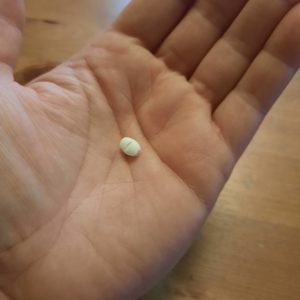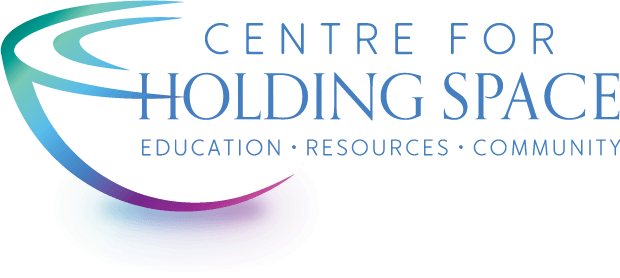One of our guiding principles at the Centre for Holding Space comes from Christina Baldwin’s book, The Seven Whispers: A Spiritual Practice For Times Like These. It goes: “Ask for what I need, and offer what I can.”
This little truism is the foundation of our relationships – between Heather and me, between us and our team, and between all of us and our course participants.
Many folks find the first half of this principle tough, especially when they have been enculturated or socialized to not prioritize their own needs. Am I allowed to ask for what I need? How do I know what I need? Do I even have needs?
It often seems easier to focus on the other half, to offer what you can. It feels safer or less risky to give and give and give – even beyond what you can sometimes – in order to attempt to ensure your belonging. (FYI, giving more than you can is sometimes a good indication that what you need is assurance of your belonging!)
In my experience, almost every instance of nervous system activation (fight/flight/freeze/fawn) is an invitation to hold the question “What do I need?” with tenderness and curiosity.
However, sometimes your nervous system is so overstimulated that your ability to answer that question becomes startlingly diminished.
For the past year (two? three? I’m not sure I can pin a start date to this) I have found myself saying things like, “I feel so overwhelmed these days.” Or, “I wish I could just have five minutes where nobody needed anything from me.” Or, “I’m so weepy all the time. I feel like my capacity to handle things has evaporated.” Or, “I don’t know if I can keep this up anymore.”
I wear a lot of hats. In addition to helping run the Centre, I help run my church. I also occasionally virtually assist a client with her work in the U.S. I still have a small Mary Kay business, and I manage the schedules, meals, appointments, and taxi-ing around of my two teen sons. There are a lot of balls in the air for me at all times – bookkeeping, bill paying, email answering, phone call making, service planning, meeting running, course helping, cooking, driving, laundering, cleaning, etc., etc., etc.
“It’s just this time of my life right now,” I tell people. “It will ease up in a few months,” I claim. “This just is what it is,” I try to assure them and myself.
The reality is that all of those things are, in many ways, true. I am in the process of helping my church transition away from me and into whatever else they are going to do next. That should wrap up in the next year or so. I have had to hold down the fort while Heather was away travelling and finishing up writing and editing her book, which has included helping with more course calls than I have in the past, and attempting to help with marketing more than before. My oldest can’t drive himself places yet, so he still relies on me to get him everywhere he needs to go. It is what it is right now.
And I have been frustrated at how overwhelmed I have felt by it all. I told a friend the other day that I feel like I’ve misplaced the valve on the pressure cooker of my brain. None of my old tips and tricks for completing my stress cycle are working. I’m working out regularly, I’m trying to get back to taking stupid walks for my stupid mental health, I see my friends and trusted confidants and talk things out, and it’s all falling flat. The pressure is not going away. Instead, it feels like it’s building on itself and getting worse. Trying to figure out “what will work to make me feel better” only compounds my frustration because now self-care feels like work and that kind of defeats the whole purpose!
I used to feel like I was good at seeing both the forest and the trees – I could see the big picture of where things were going as well as the details that needed tending to – but lately, it’s felt like nothing but a thick, thick wall of trees that seems utterly impenetrable. I can’t access the ‘big picture’ anymore. I can’t find the hope that that big picture usually gives me.
Heather has often remarked at how high my capacity is and I have despaired of late that that may no longer be true.
In the face of all of this, I have been asking myself since September, “What do I need?” Maddeningly, I keep coming up blank. So many people have offered to help me, but I’m in multiple situations where I have so few tasks that I’m able to offload. Right now, 98% of what is on my plate is simply showing up – for our business, for my church, for my clients, for my family. Just be there. Be available when we need you. Plan and prep and hold the spaces for us so we can work through things or get things done. Usually, being able to show up and hold space in the ways that I’m good at is an energy giving experience for me. It has not been of late. Additionally, my brain is normally really happy being able to check tasks off my multiple lists, but recently all the tasks feel like a never ending sink full of dirty dishes in a 24-hour restaurant – they just keep coming no matter how many I wash.
This week, I dumped all of this on my doctor at my yearly physical (which I haven’t had in over 2 years). She listened to me as I tried to explain it all away as ‘circumstantial’, and ‘probably perimenopause or post-pandemic fatigue’, and then kindly suggested that maybe, if the increase in anxiety/decrease in emotional capacity is new, that we might want to address it. Had I ever tried therapy?
Yes, I told her, but I am an excellent talker and know all the things so therapy doesn’t always feel like the right approach for me. Between my therapist friends, and the therapy-type tools and resources we offer in our courses, I am wildly skilled at being able to bypass anything good a therapist might try to figure out with me through talk therapy. I’m certainly not opposed to it and will definitely try it again, but I’m not sure it’s the answer to ‘what I need’.
What about medication? She offered. Would you like to maybe try something?
A sleep aid? I asked. My sleep has been terrible lately.
Turns out, new research is showing that sleep medication is not doing what people want it to do – it’s not improving sleep as much as it should. Instead, they’re finding that anti-anxiety medications are doing a better job at improving people’s sleep because, well, their brains are no longer trapped in rumination and catastrophizing and waking them up like a teething toddler every few hours.
Listen, I recognize a life raft when I see one.
I am definitely pro-medication. I think science is an actual wonder, even if it doesn’t know everything about everything yet. The distance we have come from the undiagnosed, untreated anxiety my grandmother had to suffer through to my doctor’s ability to choose from a list of potentially helpful medications for me is mind-bogglingly amazing. So yes, I am definitely interested in assisting my poor, exhausted, overwhelmed brain through the wonders of science.
 Here she is. Half a little white pill once a day.
Here she is. Half a little white pill once a day.
Sometimes, you don’t know exactly what you need until someone offers it to you. It’s like when you can’t figure out why you’ve been cranky and annoyed until someone gives you something to eat and you realize you’ve been hungry and needed food. Or like when you’ve had a headache all day and your partner or someone on social media randomly asks if you’ve had any water to drink. Go figure. You are thirsty. You need hydration.
And sometimes, you are such a ‘high capacity’ person that you’re like the frog in the pot of water that’s slowly being brought to a boil. You don’t realize you’re starting to cook until it’s almost too late. You’re fine until suddenly you’re not.
This pill is not judgement. It is not shameful. It is not a failure. Nor is it a cure or a thing that will ‘save’ me or dramatically change my life. It is simply a PFD – a personal floatation device.
This pill does not mean that I am broken. I don’t believe any of us are broken, actually. I think that we instead exist in systems that benefit from us not being whole. And until we can move the needle on improving those systems, we lean on the PFDs of medication, community, and tenderness.
It’s okay to not be okay. And it’s okay to not always know what you need. In the immortal words of Douglas Adams’ Hitchhiker’s Guide to the Galaxy: Don’t Panic. You will figure out what you need eventually. Just be open to the offerings that you might not have expected or even necessarily thought would be a thing for you. (For example, in the above mentioned book, the main character, Arthur Dent, had no idea why he needed the towel Ford Prefect insisted he hang onto until he suddenly really needed it!) Try to recognize the PFD when you see it.
I don’t yet know what it will be like to be on this pill. It takes a few weeks for it to start to take full effect. I don’t know how my brain or my body will respond. I do know that my sisters have had good experiences with this particular drug, so I’m hopeful it will be the same for me. I also know that I am in very good company – we are not ‘weak’ for needing medication to help regulate the complex organ of our brains. It takes a lot of strength to ask for what you need, and, sometimes, even more strength to actually receive help when it’s offered.
That’s all I wanted to say. Oh, and this – I love you. You look great today.
*****
If you want to learn more about learning to hold space for yourself, consider joining our Holding Space Foundation Program. It’s a whole module and it’s a profound one!

